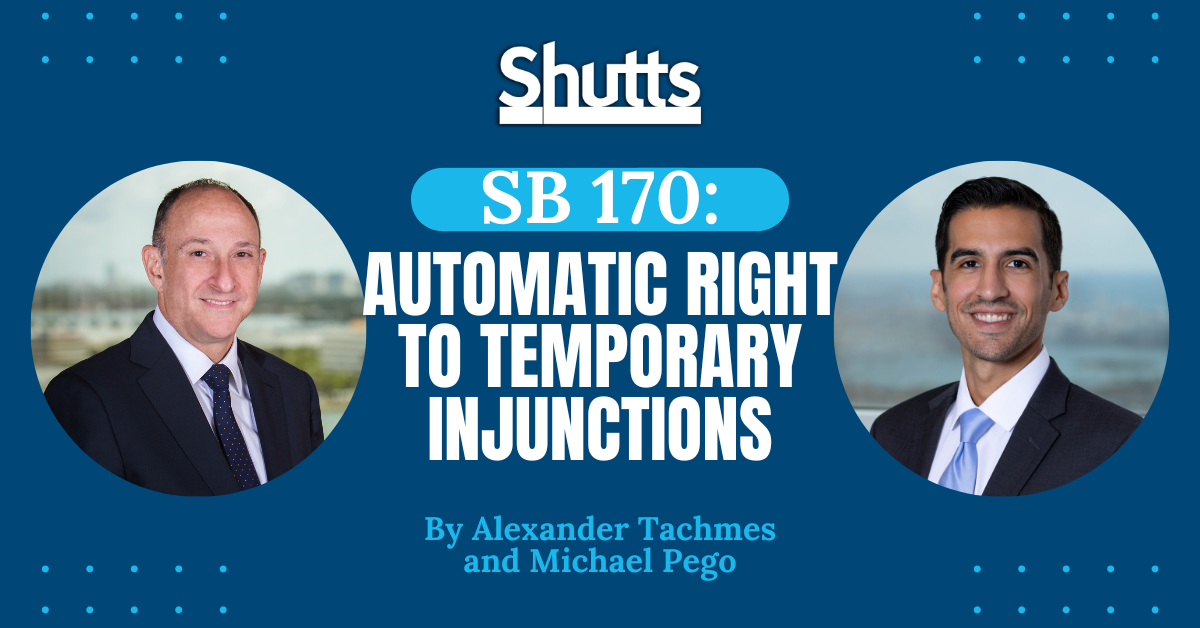 This article appeared in the Daily Business Review on August 10, 2023.
This article appeared in the Daily Business Review on August 10, 2023.
Commentary provided by Alexander I. Tachmes and Michael Pego.
On June 29, 2023, Gov. Ron DeSantis signed into law Senate Bill 170, which will likely have an important effect on lawsuits that are brought against local governments to invalidate new ordinances. As described further below, the law creates an automatic right on the part of plaintiffs to obtain a preliminary injunction against a local government during the pendency of litigation that is brought to strike down certain types of ordinances. Under the new law, there is no need to prove the traditional elements of a preliminary injunction (i.e., likelihood of success on the merits, irreparable harm and lack of an adequate remedy at law). The law takes effect Oct. 1, and applies to ordinances adopted after that date, subject to certain exclusions.
Under the new law, the enforcement of an ordinance is automatically suspended if a plaintiff sues to invalidate the ordinance, requests suspension in the complaint and alleges that the ordinance is invalid due to preemption under state law or because the ordinance is arbitrary or unreasonable. The action must be filed no later than 90 days after the adoption of the ordinance. Actions under the new law are required to be given priority on the court’s calendar.
Law firms are often contacted by clients who are facing the adverse effects of a newly adopted local ordinance. These clients seek advice on how to mitigate the negative effects of the new law and other related guidance. In such cases, the legal analysis may include an examination of the merits of commencing litigation against the applicable local government in order to try to strike down the new law.
The decision by a business as to whether to sue a local government is a complex one. One major consideration is the amount of legal fees to be incurred by the business in the litigation. Local governments often have unlimited outside counsel budgets and/or substantial in-house legal departments. If a business is not especially well-capitalized, it may not be able to afford lengthy, drawn out litigation against a local government. In addition to the foregoing, the affordability of litigation can become an acute problem if, due to the new ordinance taking effect, the business must shut down completely or reduce its operations while the case is ongoing. If a business can stay open but must restrict its operations to comply with a new law, the restrictions can still lead to substantial reductions in revenue, layoffs of employees, inability to pay rent to the business’s landlord, damage to the business’s reputation and brand and other consequences. If the business cannot afford to pay its rent and employees, it is unlikely to be able to afford major legal fees in a lawsuit against a city.
To mitigate the above situation relating to the affordability of litigation, plaintiffs counsel in such suits typically files a motion for temporary injunction contemporaneously with the filing of the complaint. The goal of the motion is to freeze the effect of the new law while the litigation is pending and allow the business to keep operating. To get a favorable ruling on the motion for temporary injunction, a plaintiff generally must prove likelihood of success on the merits, irreparable harm and inadequacy of a remedy at law. The importance of winning a temporary injunction motion in such cases places substantial weight on whether the plaintiff can meet the burden of proving the elements of a temporary injunction. Even if a lawsuit has strong merits, a plaintiff may decline to sue if its chances of winning a motion for temporary injunction are low. Or, a plaintiff may consider dismissing a lawsuit if it loses its motion for temporary injunction.
As indicated above, certain types of ordinances are excluded from the scope of SB 170, such as ordinances relating to the adoption of city or county budgets, ordinances relating to procurement and ordinances relating to the Building Code or Fire Prevention Code. Nonetheless, the impact of the Act should be significant in facilitating the filing of meritorious litigation and creating more economic parity between a local government and a plaintiff business in their respective abilities to fund the cost of litigation.
Alexander I. Tachmes is a partner in the Miami office of Shutts & Bowen, where he is chair of the land use practice group and a member of the real estate practice group.
Michael Pego is an attorney in the Miami office of the firm, where he is a member of the real estate practice group.
